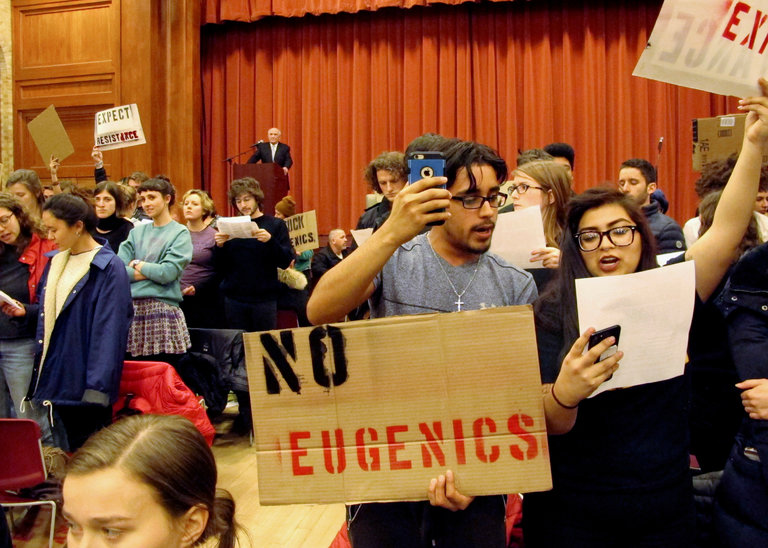A protest at Vermont’s Middlebury College against conservative author Charlies Murray, who was invited to speak, quickly got out of hand last week—ending with one person in the emergency room. Murray, the author of “The Bell Curve: Intelligence and class structure in American Life,” had to be escorted out of the room after students became hostile.
The incident comes weeks after another controversial conservative—former Breitbart Editor Milo Yiannopoulos—sparked protests at the University of California at Berkley. So should these speakers have been heard? Or should a segment of a college community be able to veto a voice? Civil liberties attorney Harvey Silverglate; professor of sociology and women’s studies at Wheelock College, Gail Dines; and Lee Pelton, president of Emerson College joined Jim Braude (@jimbraude) to discuss.
“If somebody can’t state a controversial view on a liberal arts campus, then it’s not a liberal arts campus,” said Silverglate, adding the students "have a right to speech, but they don’t have a right to stop him [Murray] from speaking.”
“The hallmark of free speech is not to protect comfortable speech,” agreed Pelton—a statement Dines took a step further in her assertion that it is the job of colleges, universities and their professors not just to promote diversity of speech and perspectives, but also to guide students through these conversations and “engage them in intellectual curiosity.”
Dines did, however, draw the line at Milo Yiannopoulos, who she said she would not want to see on a college campus because he incites others. “I think he comes in… to incite racial hatred, to incite homophobia, to incite misogyny,” she said.
When questioned as to whether she would bar President Donald Trump from a campus, given many people have leveled the same arguments against him, Dines responded, “I wouldn’t bar him, but I would certainly love to have classes all around discussing exactly his views and what fake news looks like and how he got elected.”

Students at Middlebury College in Vermont turned away as Charles Murray lectured at the college. The author of “The Bell Curve: Intelligence and class structure in American Life,” had to be escorted out of the room after students became hostile.(Lisa Rathke/Associated Press)
Pelton disagreed on this point, saying the main issue for him is not “emotional safety,” but physical safety for all parties involved. “I think that any provocateur, whether it’s the left or the right should be, under most circumstances, allowed to speak,” said Pelton. “If you invite someone to campus and it’s clear that their presence on campus is going to create some kind of disruption that you cannot prepare for, then you might make a decision [to cancel], but that’s not about that person speaking.”
“Once you start making an exception, ultimately the exception overcomes the rule,” countered Silverglate.
On the issue of how far an institution or its professors should push its students, the three fiercely disagreed. While Pelton argued “the best learning occurs from a place of discomfort,” Dines raised the concern that “there’s a line you cross with discomfort where you can actually traumatize your students.” At that point, according to Dines, the students shut down and are no longer able to learn.
“Higher education is traumatizing,” responded Silverglate. “Everything they [students] have learned up until the time they get to college gets challenged. Some people consider that traumatizing. If it really is traumatizing, they should quit.”
Related: Are College Administrators Stiffing Free Speech On Campus?










